Spelling plurals
2 Replies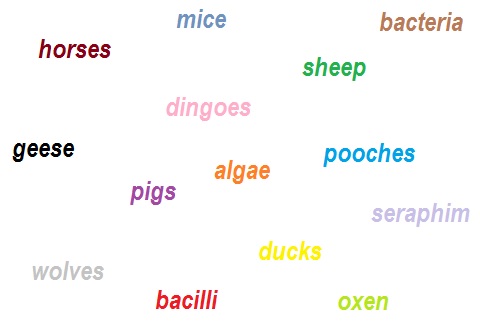
I'm always amused to find spelling books containing rules like: "To form the plural of most nouns we just add an 's'", as though children not taught this are likely to say or write the plural of "cat" as "catm" or "catb".
Spelling regular plurals
The only tricky thing about spelling regular plurals for most children is knowing to use the letter "s" regardless of whether the plural morpheme sounds like:
- "s" as in "cats", "ducks", "tops" and "chefs", when it follows a voiceless sound, or
- "z" as in "bees", "hens", "bags" and "gloves", when it follows a voiced sound.
Well, rappers write what they hear: "dogz", "beatz" and "boyz", but the rest of us stick with the letter "s".
This also applies to:
- third person singular "s" verb endings, as in "he jumps", "she swims" and "it flies" (not "she swimz" or "it fliez")
- possessive apostrophe + "s" as in "Tim's cat", "Pat's dog" and "Jan's last holiday" (not "Tim'z cat" or "Jan'z holiday")
The spelling ough
14 Replies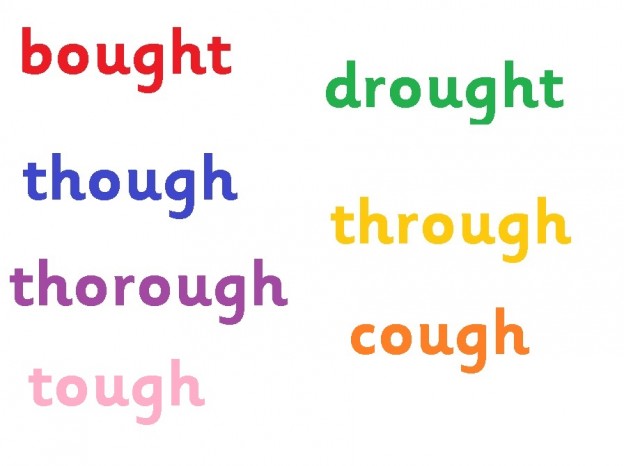
The spelling "ough" can be pronounced eight different ways in English.
Don't panic, there aren't many words, and some of them are so arcane I usually don't bother teaching them. But let's be fairly comprehensive here.
There are five different single sounds, and three sound combinations.
- "aw" as in bought, brought, fought, nought, ought, sought, thought and wrought iron.
- "ou" as in when the bough or the drought breaks, and the UK spelling of plough (in the US regularised to plow), as well as doughty old characters, the soughing wind and a deep slough of depression.
- "oh" as in dough, furlough and though, as well as doughnut and although, if you want to count them separately.
- "ooh" as in through.
- "uh" as in thorough and borough, and names like Gainsborough, Marlborough, Peterborough and Scarborough.
- "u" plus "f" as in rough, tough and enough, plus a snake sloughing off its skin.
- "o" plus "f"* as in cough, former Australian Prime Minister Gough Whitlam and a cattle trough.
- "u" plus "p" in hiccough, though nowadays many people seem to spell this hiccup.
That's it, as far as I know. Not so terrible after all.
* The "gh" spelling of the sound "f" is also used in the word "laugh", and goes after a vowel. Before a vowel, "gh" usually represents the sound "g" as in "Afghan", "ghost", "spaghetti" and "yoghurt".
Top early literacy apps 2014
9 Replies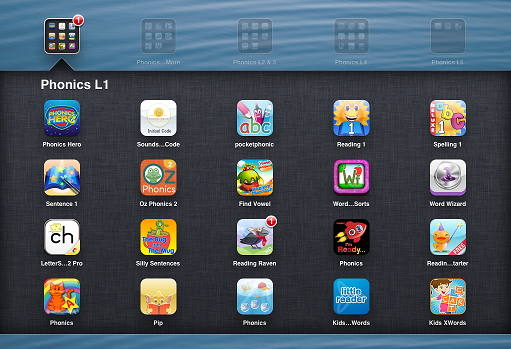
I’ve spent far too much of the last couple of long weekends searching for, and trying out, new iPad apps for teaching early reading and spelling.
Every time I do this, I feel very sorry for parents doing the same thing.
There were 1729 search results on the word “phonics”, 7,960 on “reading” and 2634 results on “spelling”. Where to start?! Even an opinionated person who knows what she’s looking for gets a bit overwhelmed.
There are few really good early literacy apps
Most early literacy apps are frankly dross, IMHO. I wouldn’t want any kids I know to use them.
A lot of expert reviewers also seem to recommend apps that make me scratch my head, and wonder whether they really work with reading/spelling beginners, or understand our spelling system.
I ended up deleting most of what I downloaded, because most of them looked better in the store than they were when I tried them, and some looked downright confusing and possibly harmful to children’s learning.
However, there were quite a few nice ones I hadn’t seen before. Some of them are fairly teddy-bearish and really only suitable for ages 4-7, but lots of them can also be used with older, low-progress learners too.
(more…)Handwriting
3 Replies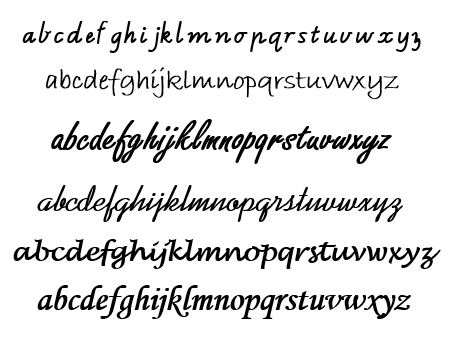
I recently met a smart, motivated child who is struggling with written work. His teacher reports problems with sounding out, sound-letter relationships and handwriting.
He's been gettings specialist help with handwriting, so to tackle sounds and letters, we started on my Level 1 workbook. The first four pages involve listening to 12 little words (ad, at, dad, pop, tap, pod, dot, pot, top, pat, tot and pad) illustrated by line drawings, and completing the labels on the drawings using three consonant letters (d, p, t) and two vowel letters (a, o). This is done in four stages: first sounds, last sounds, middle sounds then writing the 12 whole words.
So it's not difficult, and even quite confused Grade 1 children can usually quickly write all twelve words correctly, with a bit of encouragement and help.
Then I give them an enormous tick, four stickers and a big hooray, tell them they are extremely clever, and if the parents speak English, I grab one of them at school pickup time, get the child to demonstrate their brilliance at the workbook, practice doing a few pages together, and get them to agree to take the book home and finish it (having a large caseload really fine-tunes one's efficient-farming-out-work skills).
What's important in letter formation?
However, yesterday's smart, motivated child wasn't happy with my workbook's font, especially the letter "p".
Free spelling book
2 Replies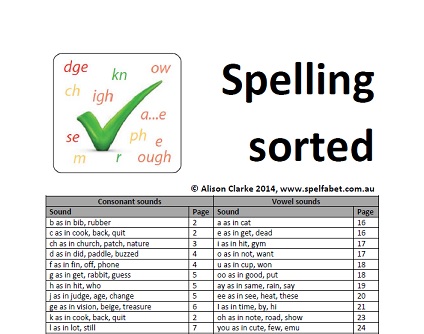
I’ve been trying to think of ways to help teachers organise their thinking about sounds and letters, and make teaching children about sounds and spellings seem interesting, finite and do-able.
Years ago I went through the whole dictionary and sorted it by sound (phoneme) and spelling pattern (grapheme), and made a spiral-bound booklet of spelling lists for myself called Spelling Sorted.
This put examples of every spelling pattern at my fingertips.
Showing learners the patterns
It let me confidently demonstrate to learners both the major patterns (like the “ai” in “rain”, “sail” and “maid”), and unusual ones (the “ai” in “said”, and also “again” and “against”, if you have an Australian accent like me).
It let me show learners how some spellings are shared by more than one sound, e.g. the “ou” in “shout”, “soup”, “country”, “soul”, “cough” and even “ouija” (incidentally, a word created by putting the French and German words for “yes” together).
It also helped me explain to learners that English spelling is complex because English is made up of words from many languages. For instance, the “ph” in “phone”, “elephant” and “alphabet” is usually in words that come from Greek, and the “é” in “café”, “paté” and rosé” is usually from French, and words with “ng” like “sing”, “long” and “hang” are usually Germanic-origin words brought into English very early by the Angles, Saxons, Jutes or Vikings.
The 100 most annoying words
1 Replies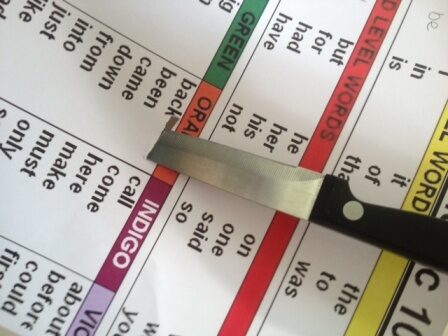
I’ve been working with a little girl in her second year of school who is taking a long time to understand sounds and letters, so I’ve scheduled some extra one-to-one time with her each week.
Last year, she had pretty much nailed the “short” vowels (“a” as in “hat”, “e” as in “red”, “i” as in “sit”, “o” as in “not” and “u” as in “fun”) in little, three-sound words. However, her responses were very slow, so I was hoping to get her faster and more automatic this term, before working on longer words and extra spellings next term.
Suddenly yesterday, whenever I asked her to write a word containing the “short” vowel sound “u”, she wrote “a”. I asked for “sun” and she wrote “san”, I asked for “duck” and she wrote “dack”, I asked for “nut” and she wrote “nat”. Argh. What happened?
The Golden Words
She has a really lovely teacher, who is also very concerned about her slow progress, and who mentioned in passing in the hallway that she’d sent home the “Golden Words” for the family to work on.
The “Golden Words” are the first 12 “sight” words in a high-frequency-words-based literacy scheme called the Magic 100 Words, which is popular in my local schools, and seems to be recommended to undergraduate teachers as their first literacy priority. The words are “a”, “and”, “be”, “I”, “in”, “is”, “it”, “of”, “that”, “the”, “to” and “was”.
So that’s what happened. The child has been practicing reading the word “a” as “uh”, and now she sees the letter “a” in a word and says “uh” too. “Uh” as in “drat”.
I’m sure once I have a chance to discuss this with the teacher and send home some different things to practice, this student will be back on track. However, it would be great if teachers graduated with something less confusing as their early literacy starting point. Think about what sounds the letter “a” represents just in the 12 “Golden Words” above. There are three different sounds – “uh” as in the word “a” (I wish people would say “ay” – click here for an earlier blog post about this), “a” as in “that” and “o” as in “was”. Totally, totally confusing for beginners.
The 100 Most Annoying Words
The mother of another young client told me the other day that they have started calling the 100 most frequent words “The 100 Most Annoying Words”. I think this is brilliant and will be calling all high-frequency word list this from now on.
I count a total of 74 different letter-sound correspondences in the Magic 100 Most Annoying Words:
Spelling Latin endings
10 Replies
Words with Latin endings can be confusing to spell. To get a handle on them, I like to organise them into groups:
“sh” sound Latin endings
- Many, many words have the sound “sh” spelt “ti” as in “action”, “cautious” and “patient”.
- Some others are spelt with “ci” as in “special”, “magician” and “vicious”.
- A third group are spelt with “si” as n “mansion”, “tension” and “extension”.
- A fourth group are spelt with “ssi” as in “mission”, “passion” and “discussion”.
Some spelling reformers would have us spell all these words with “sh” – “acshon”, “speshal”, “manshon”, “mishon” etc, like rappers do. But I hope this table makes their current spellings seem more logical:


